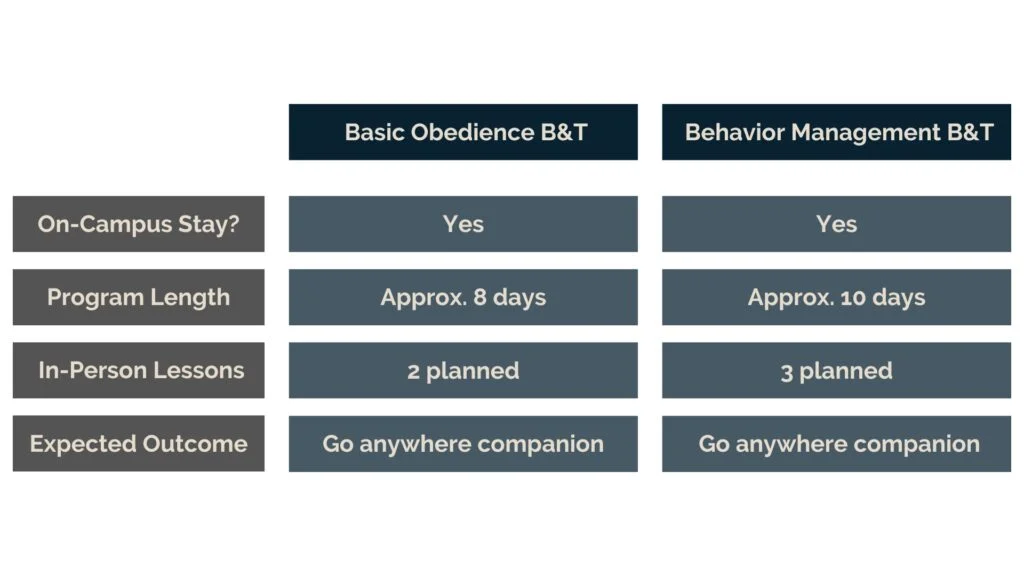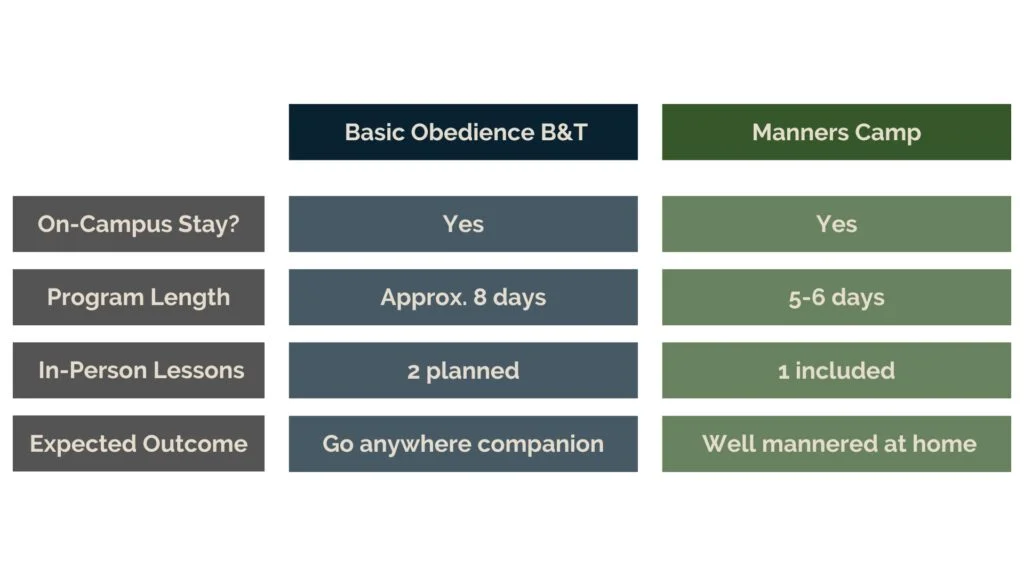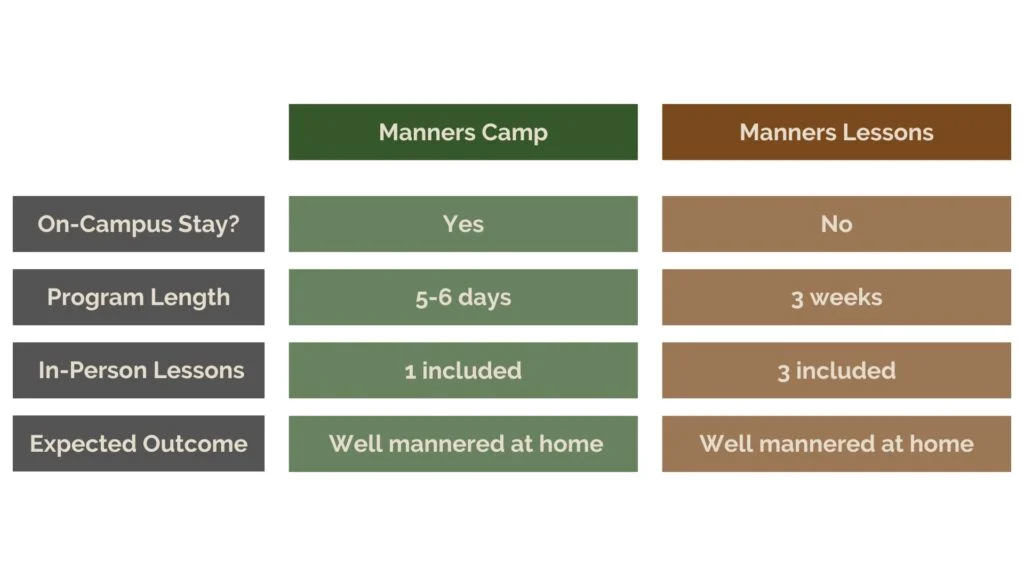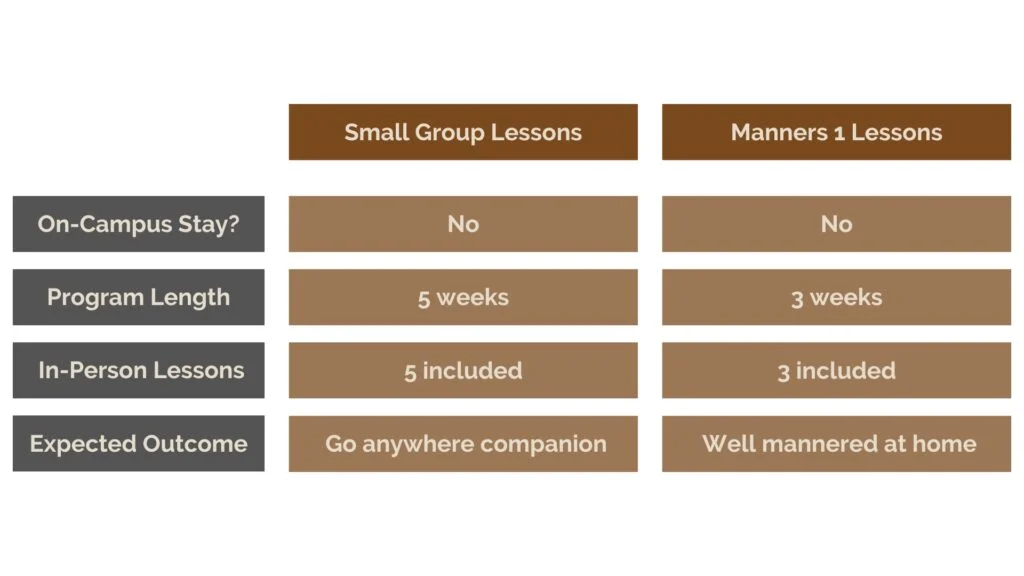Finding the Best Match for Your Family
Canine Academy offers training services designed to meet your dog’s needs and match your lifestyle. First, consider whether you have the time and energy to dedicate to giving your dog the new skills they need to be your best canine companion. If so, a lesson program might be right for you. If you prefer to have one of our professional trainers work hands-on with your dog and coach your family through successful habit building, our board and train programs or manners camps can accelerate your success.
Finally, consider your dog’s current behavior. Do you have a puppy? Are you struggling with symptoms of reactivity or separation anxiety? Or do you just want the reliable canine companion of your dreams? Our programs are specifically designed to support you in creating the canine companion you want, no matter your current state.
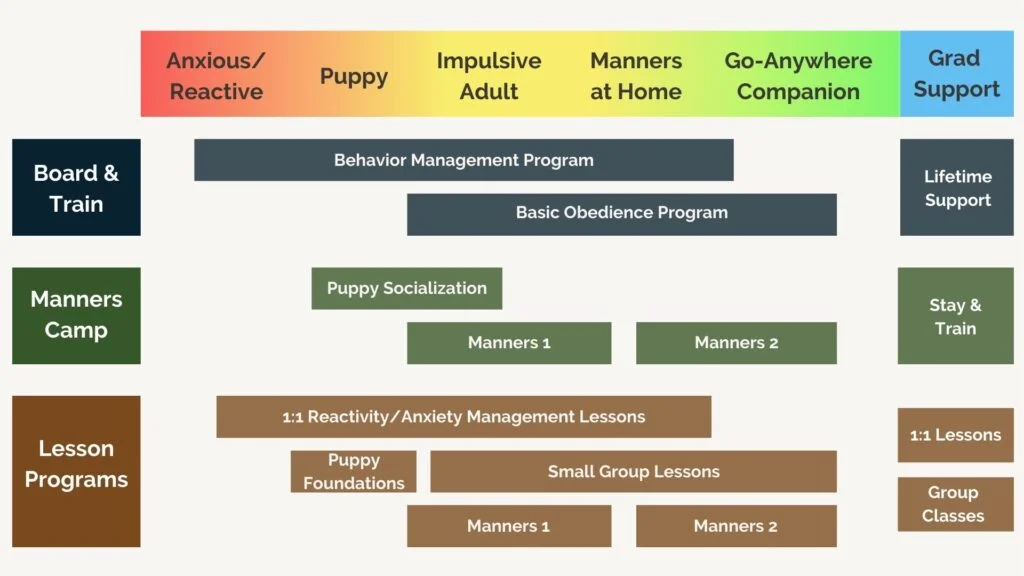
Canine Academy Service Offering
Canine Academy’s Board & Train Programs support dogs and their owners from drop off day through the rest of their lives. Each of these programs includes a stay and training on our campus, performance-based release from the program, a 90-day at-home follow-up program, and lifetime support. These programs are only available at Canine Academy’s main campus. Transport to and from partner locations is available on request.
Behavior Management Program. This program is recommended for dogs that struggle with fear-based aggression or with moderate to severe anxiety. The Behavior Management program commits to improving your dog’s confidence, and your confidence in your dog, so that you can enjoy life together.
Basic Obedience Program. This program is recommended for dogs over 5 months old that do not suffer from severe anxiety or fear-based aggression. The Basic Obedience Board and Train program commits to giving you a go-anywhere companion for life!
Manners Camp programs include a stay and training on campus, an intensive go-home lesson to prepare your family for success, and a follow-up phone call to make sure the transition home is smooth. These services are available at our Main Campus as well as at partner locations.
- Puppy Socialization. This program is intended for puppies that are fully vaccinated, but are not yet ready for their adult skills. During a stay on our campus, your dog will work on socialization, confidence building, and basic manners.
- Manners 1. This program is intended for dogs that are social, but struggle with impulse control around the house. The goal of the program is to focus on a subset of basic obedience commands that are particularly useful for house manners.
- Manners 2. This program is a continuation of Manners 1, intended for graduates of the program that would like to work on reliability under increased distraction and various environments. Graduates of the program can expect a go-anywhere companion.
Lesson programs include weekly lesson-based learning with a trainer, either in a 1:1 or small group environment. These programs include the prescribed classroom sessions, as well as a follow-up phone call to support progress at home. These services are available at our Main Campus, at partner locations, and in-home where required.
Lessons for Anxiety or Reactivity Management. This program is recommended for dogs and their families that either will not succeed in a group class environment, or could benefit from additional applied guidance from a trainer. Dogs and their owners can expect to improve confidence and build trust to reduce anxiety and reactivity.
Small Group Lessons. This program is intended for social but impulsive dogs and their families. In this program, owners can expect to learn how to turn their dog into a go-anywhere companion through basic obedience.
Puppy Foundations. This program is intended for puppies 10-20 weeks that have received thier first round of vaccinations. During a 1:1 lesson or series of small group sessions, you your dog will work on socialization, crate training, and housebreaking.
- Manners 1. This 1:1 program is intended for dogs that are social, but struggle with impulse control around the house. The goal of the program is to focus on a subset of basic obedience commands that are particularly useful for house manners.
- Manners 2. This 1:1 program is a continuation of Manners 1, intended for graduates of the program that would like to work on reliability under increased distraction and various environments. Graduates of the program can expect a go-anywhere companion.
Still not sure how our programs stack up?
Overview: Both of these programs are intensive board and train programs with a lifetime commitment of support. The main distinction when choosing between these programs is your dog’s starting point: does your dog suffer from reactivity or anxiety, or are they simply rude or inconsistent?
Overview: Both of these programs are intensive board and train programs suitable for dogs older than 5 months that do not suffer from anxiety or reactivity. The main distinction when choosing between these programs is your desired result: do you want a dog that is a well-mannered house pet, or do you want a go-anywhere companion?
Overview: Both of these programs aim to turn your rude or inconsistent dog into a go-anywhere companion. The main distinction between the programs is in learning format: do you want to learn via weekly lessons, or do you want a training stay?
Overview: These programs are complimentary, with Manners 1 being an introduction to our basic obedience methodology and commands, and Manners 2 aiming to deliver resistance to any distraction. It is required to complete Manners 1 prior to enrolling in Manners 2.
Overview: Both of these programs aim to turn your rude or inconsistent dog into a well-mannered house pet. The main distinction between these programs is the learning format: do you want to learn via weekly lessons, or do you want a training stay on campus?
Overview: Both of these programs aim to turn your reactive or anxious dog into a go anywhere companion. The main distinction between these programs is the learning format: do you want to learn via weekly lessons, or do you want an intensive boarded training program?
Overview: Both of these programs are appropriate for dogs older than 5 months who are social but inconsistent. The main distinction between these two programs is the expected outcome – are you looking for a go-anywhere companion, or for a dog who is well-mannered at home?
